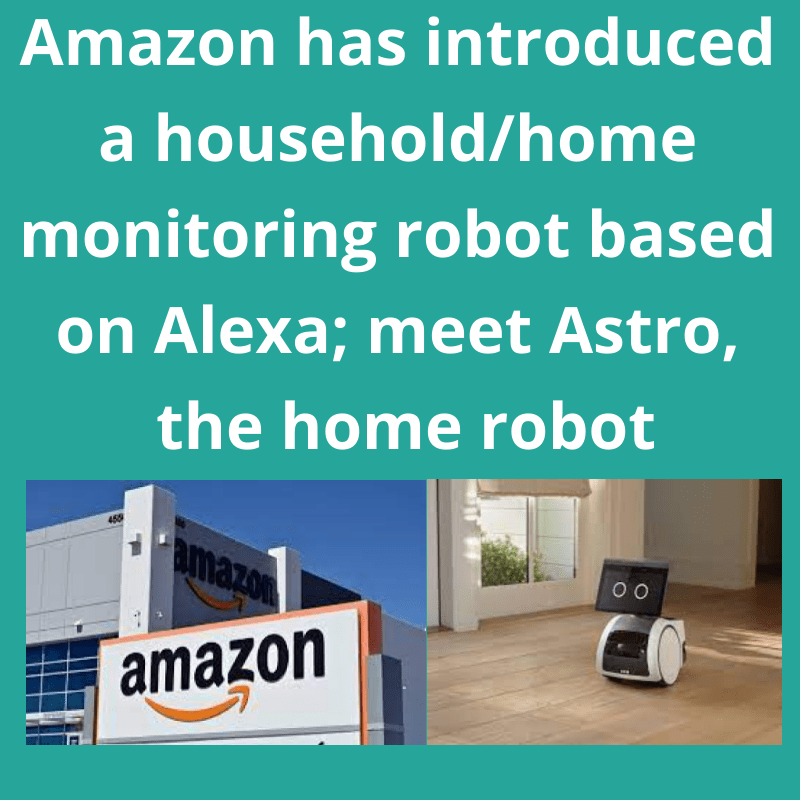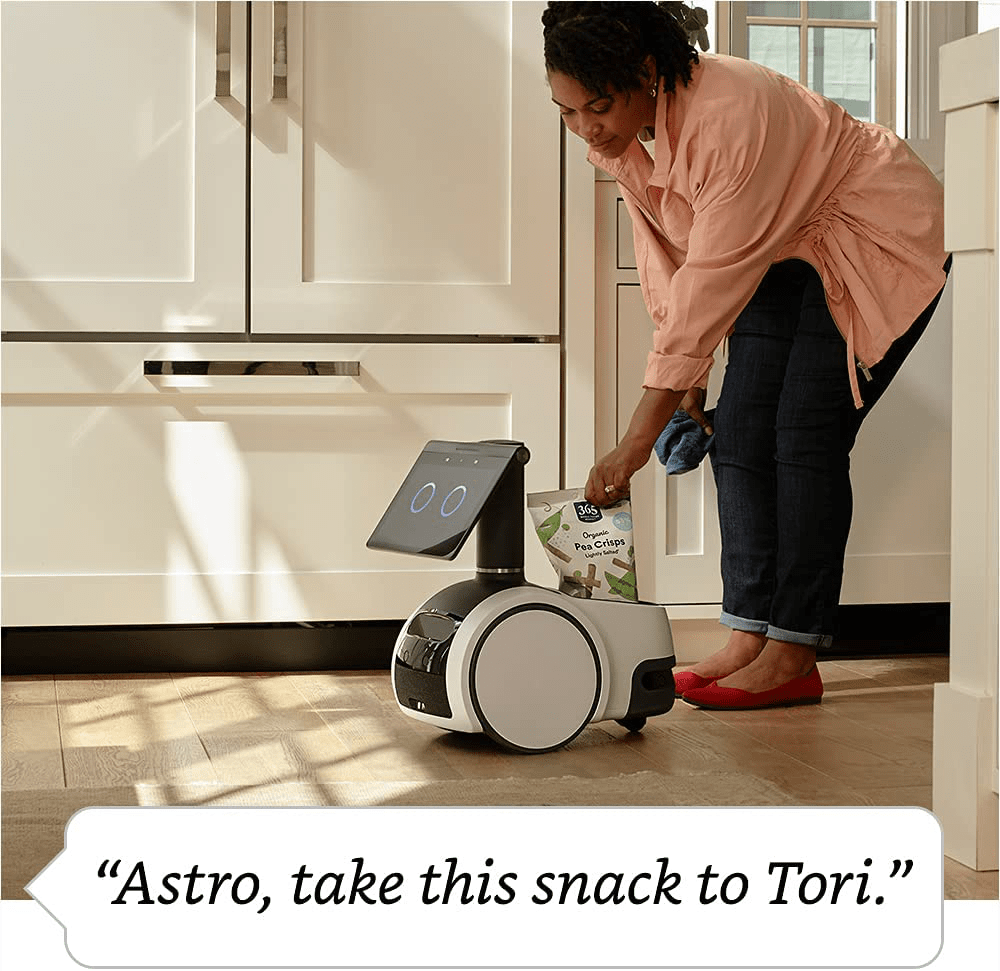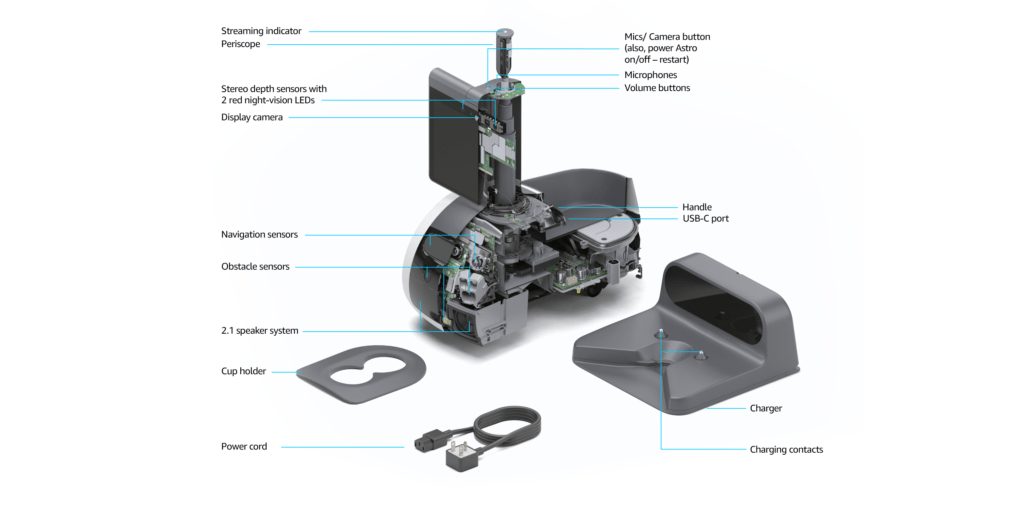
In September 2021, Amazon launched a new home robot known as Astro. According to Charlie Tritschler, Vice President of Products at Amazon, during a team meeting with his colleagues, they were asked a big question on how consumer electronics and Artificial intelligence (AI) would be more helpful in future homes which led to a thought-provoking and an exciting discussion about a vision for home robotics and how robots could help people in new ways at home, and then Amazon’s first robot for the home was born.
The Astro home robot, according to Amazon is a new and unique type of robot that is designed to assist in carrying out a variety of tasks such as monitoring the home and people staying in touch with their family. It combines new advances in artificial intelligence, computer vision, sensor technology, voice and edge computing in a package that is intended to be supportive and convenient.
Amazon promises Astro will be able to help you care for your elderly relatives and loved ones; check in on your home while you are away by autonomously moving and navigating around your home showing live views of rooms and specific areas via the Astro app; proactively investigate when an event is detected and automatically save the video clips to your personal cloud storage which you can then review from anywhere; bring the benefits of Alexa to you when you are home such as information, entertainment, smart home control and more.

There are privacy concerns and whether the home robot would actually benefit most people. There are also concerns about how the data collected by Amazon’s new products will help it behind the scenes, because a lot of data would be gathered ranging from full map of your home, to your behaviours and voice notes as well as the faces of everyone who visits your home.
Furthermore, the fact that Amazon’s Astro is powered by Alexa, the company’s voice assistant, does not really help matters. You may have probably experienced a voice assistant that went on at random and done exactly what you did not want. It is difficult to get voice recognition to operate reliably in the first place; picture putting the same idea on wheels and expecting it to respond swiftly and reliably in an emergency. Vice obtained leaked documents and videos of developer meetings that show Astro is conducting extensive surveillance with its facial recognition systems and the feature that follows people around if it does not recognise them. According to Vice, it is not very good at determining who people are, which could lead to Astro annoyingly nipping at the heels of people it should know. One of those who worked on it described the data collection as a “privacy nightmare.”
Amazon had specified that Astro is designed to protect your privacy, it is designed to make it easy for you to understand what it is doing at any given moment. Astro has a visible indicator light on top of its periscope that lets you know when it is streaming video or audio to the cloud. For example, when video is streamed to the cloud, such as when live view is active, the indicator light on top of Astro’s periscope will turn green. A picture-in-picture view of your own video or another on-screen indicator may also appear. When Astro detects the wake word, a visual indicator appears to indicate that Astro is recording your voice request for cloud streaming. The indicator light on top of Astro’s periscope, for example, will turn blue, and Astro’s eyes may light up blue. Also, Amazon insists that the sensor data that Astro uses to navigate your home is processed on the device and is not sent to the cloud.
Astro is built with multiple safety features, and layers of privacy and security to keep you in control of your experience and keep your data safe, including the sophisticated safety system of sensors, in combination with a dedicated safety processor, works in real time to detect characteristics such as stairs and obstructions; on-device processing feature which was designed to process lots of data on the device, together with the images and raw sensor data the device processes as it moves from place to place in your home. This on-device processing feature is used to recognise you as your visual ID is stored on the device. Astro, like Echo devices, features a microphones/cameras-off button that users can utilise to switch off cameras, microphones, and motion detection whenever they wish. Astro is unable to move or record video or audio while this button is held, and a dedicated red LED illuminates to match the red status indicator on screen.

Astro will retail for $1,449.99, but as part of the Day 1 Editions promotion, it will be available for $999.99 with a six-month Ring Protect Pro subscription trial included. Although some people may have been surprised by the price, but that is not really an issue. Astro will be accessible in limited quantities, with invites and gadgets delivering later in 2021 to Amazon customers in the United States. You can visit the amazon website at to learn more about Astro or request an invite. What do you think about the Astro home robot? Drop your comments below.



